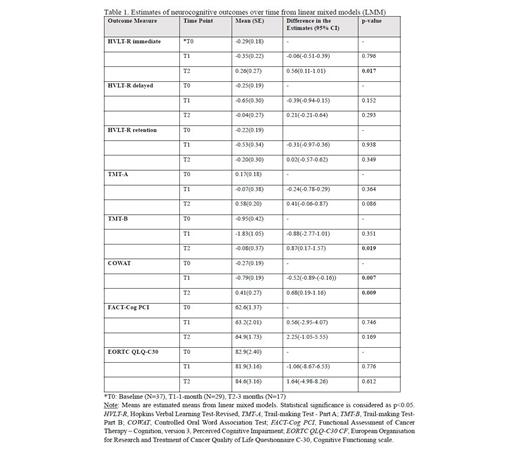Introduction
People treated with systemic therapies for cancer may exhibit changes in neurocognitive functioning over time, affecting domains such as memory, processing speed, and executive functioning. There is a need for prospective data regarding neurocognitive outcomes among patients treated with Chimeric Antigen Receptor T-Cell (CAR T) therapy. The purpose of this study was to investigate the trajectory of neurocognitive performance and self-reported cognitive functioning over the first 3 months of CAR T therapy.
Methods
As part of a larger cohort study of patients treated with CAR T, neurocognitive outcomes were assessed prior to starting CAR T and again at 1- and 3- months post-CAR T. Neurocognitive performance was measured using standardized neuropsychological tests including measures of verbal memory (Hopkins Verbal Learning Test-Revised (HVLT-R) - immediate recall, delayed recall, retention), processing speed (Trail-making Test - Part A (TMT-A)) and executive functioning (Trail-making Test Part B (TMT-B), Controlled Oral Word Association Test (COWAT)). Raw test scores were converted to z-scores (Mean 0, SD 1) based on norms adjusted for age, sex, and education, where applicable. Impairment on individual tests was defined by a z score ≤ -1.64. Participants were categorized as showing overall impairment if they had at least two tests with a z-score of ≤ -1.5 or a z-score ≤ -2.0 on one test. Self-reported cognitive functioning was measured using the Functional Assessment of Cancer Therapy - Cognition, Perceived Cognitive Impairment score (FACT-Cog3 PCI) and the European Organisation for Research and Treatment of Cancer - Quality of Life Questionnaire C-30, Cognitive Functioning scale (EORTC QLQ-C30 CF). Demographic and clinical data were collected through self-report and patient records. Frequencies of impairment were determined at each time point, with clinically significant changes on individual test scores in the first month determined based on z-score changes of ≥1.0 or minimal clinically important differences for self-report questionnaires. Linear mixed models were generated to estimate the trajectory of neurocognitive performance and self-reported cognitive functioning over time from baseline to 3 months.
Results
Neurocognitive outcomes were available for 37 participants at baseline, with follow-up data available for 29 patients at 1 month and 17 patients at 3 months. Participants were 54% male, had a mean age 58.4 years (sd 11.3) and a mean 15.5 years (sd 3.2) education. All patients had a diagnosis of non-Hodgkin lymphoma (53% diffuse large B-cell lymphoma (DLBCL), 31% transformed DLBCL from follicular lymphoma). Immune effector cell-associated neurotoxicity syndrome (ICANS) affected 32% of patients (5% Grade 4, 3% Grade 3, 8% Grade 2, 16% Grade 1). Cytokine release syndrome (CRS) affected 97% of patients (3% Grade 3, 76% Grade 2, 19% Grade 1).
Frequency of overall impairment at each time point was 10/37 (27%) at baseline, 12/29 (41.4%) at 1 month, and 3/17 (17.6%) at 3 months. At each time point, impairment was most common on tests of executive functioning and memory. Based on individual test score changes between baseline and 1 month, rates of decline on individual tests of neurocognitive performance ranged from 11.5% (TMT-A) to 34.6% (COWAT). Decline on self-reported cognitive functioning was observed for 14.3% (FACT-Cog PCI) and 28.6% (EORTC QLQ-C30 CF) of participants.
Based on mixed models (Table 1), there was a statistically significant decline in estimated mean z-scores on a test of executive function (COWAT: -0.52, 95% CI -0.89-(-0.16), p=0.007) at 1-month compared to baseline. At three months, there was a statistically significant improvement in estimated mean z-scores on memory (HVLT-R immediate recall: 0.56, 95% CI 0.11-1.01, p=0.017) and executive functioning (TMT-B: 0.87, 95% CI 0.17-1.57, p=0.019; COWAT: 0.68, 95% CI 0.19-1.16, p=0.009) compared to baseline.
Conclusions
Impairment is present in a subgroup of patients prior to starting CAR T therapy. Patients may demonstrate declines on performance-based measures and report worsening cognitive symptoms in the first month after CAR T therapy, but also improved performance in some domains by three months. Enrollment and long-term follow-up of patients in this study is ongoing. Future analyses will explore differences in trajectories among subgroups, such as those who have experienced ICANS and CRS.
Disclosures
Kuruvilla:Roche, Astra Zeneca, Merck: Research Funding; Abbvie, Amgen, Astra Zeneca, BMS, Genmab, Gilead, Incyte, Janssen, Merck, Novartis, Pfizer, Roche, Seattle Genetics: Honoraria; Abbvie, BMS, Gilead, Merck, Roche, Seattle Genetics: Consultancy; Karyopharm: Other: DSMB. Bhella:Sanofi: Consultancy; Novartis: Consultancy; Gilead: Consultancy. Chen:AstraZeneca: Membership on an entity's Board of Directors or advisory committees, Other: Payment or honoraria for lectures, presentations, speakers bureaus, manuscript writing or educational events; Novartis: Membership on an entity's Board of Directors or advisory committees, Other: Payment or honoraria for lectures, presentations, speakers bureaus, manuscript writing or educational events; Beigene: Membership on an entity's Board of Directors or advisory committees, Other: Payment or honoraria for lectures, presentations, speakers bureaus, manuscript writing or educational events; Abbvie: Membership on an entity's Board of Directors or advisory committees, Other: Payment or honoraria for lectures, presentations, speakers bureaus, manuscript writing or educational events; Bristol Myers Squibb: Other: Payment or honoraria for lectures, presentations, speakers bureaus, manuscript writing or educational events; Janssen: Membership on an entity's Board of Directors or advisory committees, Other: Payment or honoraria for lectures, presentations, speakers bureaus, manuscript writing or educational events, Research Funding; Gilead Sciences, Inc.: Membership on an entity's Board of Directors or advisory committees, Other: Payment or honoraria for lectures, presentations, speakers bureaus, manuscript writing or educational events, Research Funding. Prica:Abbvie: Honoraria; Astra-Zeneca: Honoraria; Kite Gilead: Honoraria.


This feature is available to Subscribers Only
Sign In or Create an Account Close Modal